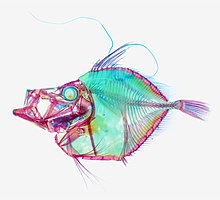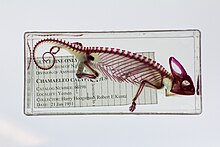Diaphonization


Diaphonization (or diaphonisation), also known as clearing and staining, is a staining technique used on animal specimens that first renders the body of the animal transparent by bathing it in trypsin, and then stains the bones and cartilage with various dyes, usually alizarin red and alcian blue.[1]
History
Diaphonization was first developed by O. Schultze in 1897, and later was modified by numerous researchers.[2][3][4][5]
Technique
Clearing renders the animals transparent and is achieved by bathing the specimens in a soup of trypsin, a digestive enzyme that slowly breaks down flesh. The dyes alizarin red and alcian blue are most commonly used in the staining of bone and cartilage accordingly. When cleared, the specimen is put in glycerin. Despite its merits, diaphonization is not widely used in the scientific field. Advancements in imaging technology have rendered the practice all but obsolete, though it is expanding as an art form.[6]
Diaphonization is not suitable for animals longer than 30 centimeters (except for snakes) due to the limited ability of the trypsin bath to penetrate the tissues of larger animals. It is usually used to preserve animals that are too delicate to dissect, and instead are kept as wet specimens.[1]
References
- ^ a b Oommen, Ansel (2014-05-14). "Dyeing the Dead: The Artful Science of Diaphonization". Atlas Obscura. Retrieved 2021-02-05.
- ^ "Elaboration of transparent biological specimens for visualisation of developing cartilage and bone". ResearchGate. Retrieved 2021-02-05.
- ^ Dingerkus, Guido; Uhler, Lowell D. (1977). "Enzyme Clearing of Alcian Blue Stained Whole Small Vertebrates for Demonstration of Cartilage". Stain Technology. 52 (4): 229–232. doi:10.3109/10520297709116780.
- ^ Dwyer, Joseph; Ramirez, M. Desmond; Katz, Paul S.; Karlstrom, Rolf O.; Bergan, Joseph (2021). "Accelerated clearing and molecular labeling of biological tissues using magnetohydrodynamic force". Scientific Reports. 11 (1). The National Center for Biotechnology Information: 16462. Bibcode:2021NatSR..1116462D. doi:10.1038/s41598-021-95692-2. PMC 8360944. PMID 34385489.
- ^ Green, Margaret C. "A RAPID METHOD FOR CLEARING AND STAINING SPECIMENS FOR THE DEMONSTRATION OF BONE" (PDF). Knowledge Bank. The Ohio State University.
- ^ "The Artful Science of Diaphonization". 20 July 2015.
